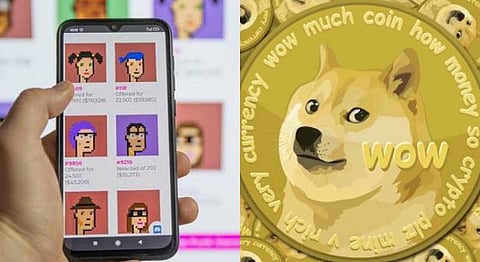
- HOMEGROWN WORLD
- #HGCREATORS
- #HGEXPLORE
- #HGVOICES
- #HGSHOP
- CAREERS
- ABOUT US
- CONTACT US

When demonetisation took place in 2016, it felt like the biggest change money was ever going to go through. New value notes were introduced, and some were taken out of the Indian currency altogether. This change was surpassed when we began to use and transact money digitally through apps like PayTM, Google Pay (formerly Tez) and more. Surely, that could have been all. We thought wrong.
Cryptocurrency has been around since 2008-2009, but gained traction only a few years ago. However, even now, understanding the intricacies of this concept is slightly challenging.
And so, we are trying to break it down for you, and we mean really break it down.
Here is Cryptocurrency 101.
Is It Coins? Is It Data? What Exactly Is It?
We stopped seeing our money as physical objects, and more as digital entries in our bank statements a while ago. We know this entity has value because the transaction we primarily earned this money through holds value. Similar to part of the law of conservation of matter, this value can not be destroyed. However, we do know that if we are in need of physical cash, we can easily pop on over to an ATM and withdraw the desired amount.
Now, here lies the first differentiator – cryptocurrency is a completely digital asset. It exists as a digital medium of exchange, and can not be translated into physical currencies. You own crypto but want to see it in cash? No can do.
Secondly, when we transact regular money, the statements are recorded in our banks – each bank you use, the statement is archived by that particular bank. Cryptocurrency transactions are recorded in a public ledger, which is essentially a record of all crypto transactions in one single platform – no separate banks exist here.
Banks Are To Money, What Blockchain Is To Crypto
While regular money has bank statements, crypto has the blockchain. It is a distributed database (or the distributed public ledger) that accounts for every crypto exchange ever made, at any time, anywhere in the world. Everyone partaking in crypto exchange has access to this blockchain. Sort of like an exposed expense sheet.
The information of exchanges is recorded in blocks. Each block contains the information of a transaction, and the transactions related to it, which are then linked, as if by a chain. Since the same ledger’s copy is possessed by all using crypto, the database is updated universally, too.
Suppose X gave Y 5 units of crypto today, and Y spends 3 of those crypto units tomorrow, both these transactions will be recorded and linked, and be available for everyone in the ledger to see all over the world.
The Power Of A Public Ledger
It is now understood that the blockchain does not require banks. This makes it extremely difficult for fraudulent transactions to take place. In a banking system, one simply has to initiate a transaction between two users, and it will be recorded in their respective statements. In the blockchain, however, the transaction is updated for everyone and so, if only one transaction is changed out of all the blocks in the blockchain, then it is easily flagged. One would have to alter the transaction of the majority of the blockchain to make for a convincing fraudulent transfer.
Unchanged Concept Of Investment
There exist over 4000 types of cryptocurrencies, each with their own set of properties and characteristics. Some popular examples are Bitcoin, Ethereum, and Dogecoin.
Investing in these refers to when one exchanges regular money for cryptocurrencies of their choice, in hopes that it will increase its value over time, and with the gained profit, they can either procure it in a now increased amount of regular money or exchange it for a more valuable cryptocurrency.
Where Crypto Ticks Boxes
Cryptocurrency was born from a place of decentralising money. As of now, money is handled and supervised by banks, states, and governments. Things like budgets, exchange rates, and money printing are all regulated by them. Currencies all over the world go through changes constantly.
Cryptocurrency is not regulated by them. Post the 2008 financial crisis, someone under the alias of Satoshi Nakamoto invented Bitcoin to democratise money. But how is it democratic?
Where Crypto Fails
Not all is well in the world of cryptocurrency. It has its own downsides, and if you’re planning to venture into this world, you must be aware of them.
In fact, crypto is quite privy to scams. Some rather sketchy, humorous scams.
Remember Squid Games? Someone base a cryptocurrency after it, called SQUID. They priced it at a penny at pre-sales but the value peaked at $2,800. When that happened, the founders sold everything they held, and even shut down the project website. They owned the majority of SQUID, which made others’ ownership valued at almost nothing, and hence, they lost money. A lot of it.
There you have it – a no-nonsense clarification on what cryptocurrency is!
If you enjoyed reading this, we suggest you also read:
